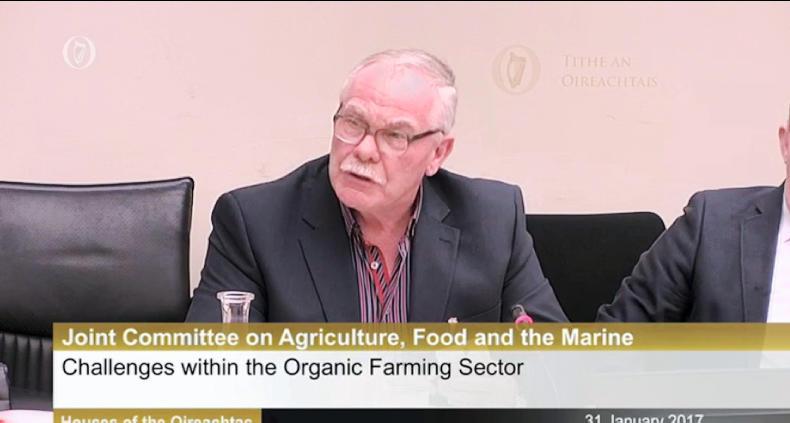Speaking at the Joint Oireachtas Committee on Agriculture this Tuesday, Penrose said the fact that none of the recommendations of the previous agriculture committee’s report on organic farming have been implemented is as much of a rebuff to the committee as it is to organic farmers.
“The greatest disappointment is that an excellent report prepared by the last committee appears to have has reached the waste-bin of the Department and got no further. That’s a major disappointment and is as much of a rebuff to us as it is to the organic farmers who expected that some progress would be made,” he said.
Organic Farmers Representative Body
Penrose was addressing members of the Organic Farmers Representative Body who were updating the committee on progress made in the organic sector to date.
The last time the representative body came before the committee was in October 2015, when its chair Padraic Finnegan outlined the challenges facing the organic sector and made some recommendations on how these could be addressed. The committee subsequently prepared a recommendation report for the Department of Agriculture. However, addressing the committee again only this week, Finnegan said that none of the recommendations have been implemented. “We came before this committee on 8 October 2015 to highlight major problems within the organic farming scheme and we were very happy with the recommendations of the committee but to date few or none of those recommendations have been implemented,” Finnegan said this week. Recommendations Among the recommendations were that the Department ensures payments in the Organic Farming Scheme (OFS) were made on time. “For various reasons, a lot of payments are still delayed,” he said. Another recommendation was that Bord Bia takes on the role of certification rather than the present arrangement where, in Finnegan’s words, farmers have to pay “outrageous fees” to private certification bodies such as IOFGA and the Organic Trust. Front-loading Finnegan also said his organisation sought to have the OFS front-loaded to lessen the effect on the smaller farmer in view of the fact that smaller farmers cannot avail of both GLAS and the OFS. “The committee has recognised that smaller farmers are not benefiting adequately from the OFS while larger farmers are benefiting disproportionately. It recommends that the first 20ha be front-loaded at €315/ha in view of the fact that smaller farmers cannot avail of both GLAS and the OFS. To date, this recommendation has not been implemented,” Finnegan said. Members of the Oireachtas Committee shared Penrose’s disappointment that none of the recommendations had been implemented so far and said they would have to "redouble" their efforts on this occasion to get current Agriculture Minister Michael Creed on board. They also expressed concern over whether enough was being done to entice young farmers into organics. Organics in Ireland Currently, 2% of land in Ireland is farmed organically, a figure well below the European average of 7%. In the Government’s Food Harvest 2020 strategy, announced in 2010, a target was set of increasing the percentage of land under organic use to 5% from its then level of 1.1%. Speaking to the Irish Farmers Journal last year, Minister of State with responsibility for the organic sector Andrew Doyle said the fact that we have grown from 1% to 2% over the last few years is a good indicator of where organics can go. “I think there is an attraction to it and an interest in it. Awareness and understanding of what it involves and can yield is very important. I think it has a place beyond 2% land use. I would like to see it go so far as 7%, which is the EU average for organic land use.” To date, few or none of those recommendations have been implemented
Smaller farmers are not benefiting adequately from the OFS while larger farmers are benefiting disproportionately
I think there is an attraction to it and an interest in it






 This is a subscriber-only article
This is a subscriber-only article











SHARING OPTIONS: